Need help formulating a winning SEO strategy to help your website rank higher in the search engine results pages (SERPs)?
Whether you’re brand new to search engine optimization (SEO) or an SEO veteran, the long term success of your optimization campaign depends on the formulation of an effective SEO strategy. SEO strategy helps bridge the gap between campaign goals and SEO tactics, helping digital marketers identify and execute on the SEO initiatives that have the highest impact on campaign success.
To help you get started on creating your own SEO strategy, we’ve created this up-to-date guide with answers to the following:
- What is SEO strategy?
- What are the key components of an effective SEO strategy?
- How do I create an SEO strategy for my website?
What is an SEO Strategy?
Digital marketers should be aware of the difference between an SEO strategy and SEO tactics or methods.
An SEO strategy is a high-level plan for organizing your SEO campaign to meet its objectives. SEO tactics are the specific techniques, methodologies, or best practices that you will implement as part of your overall SEO strategy and help drive traffic to your website from organic sources.
To throw in a sports analogy, strategy is the game plan and tactics are the playbook.
To throw in a workout analogy, strategy is the exercise plan and tactics are the exercises themselves.
To throw in a nutrition analogy, strategy is the meal plan and tactics are the recipes.
So broadly speaking, strategy is really about planning and choosing tactics, while tactics focus on the individual actions required to advance the strategy and achieve our goal.
A comprehensive SEO strategy enables digital marketers to apply their strongest SEO tactics in a cohesive manner that generates the best results in the shortest time frame. SEO strategy also helps digital marketers align their SEO campaign goals and daily activities, keeping them focused on the most important tactics that support campaign objectives.
Four Critical Components of SEO Strategy
Now that we’ve clearly defined what an SEO strategy is, let’s take a close look at the four critical components of a complete SEO strategy.
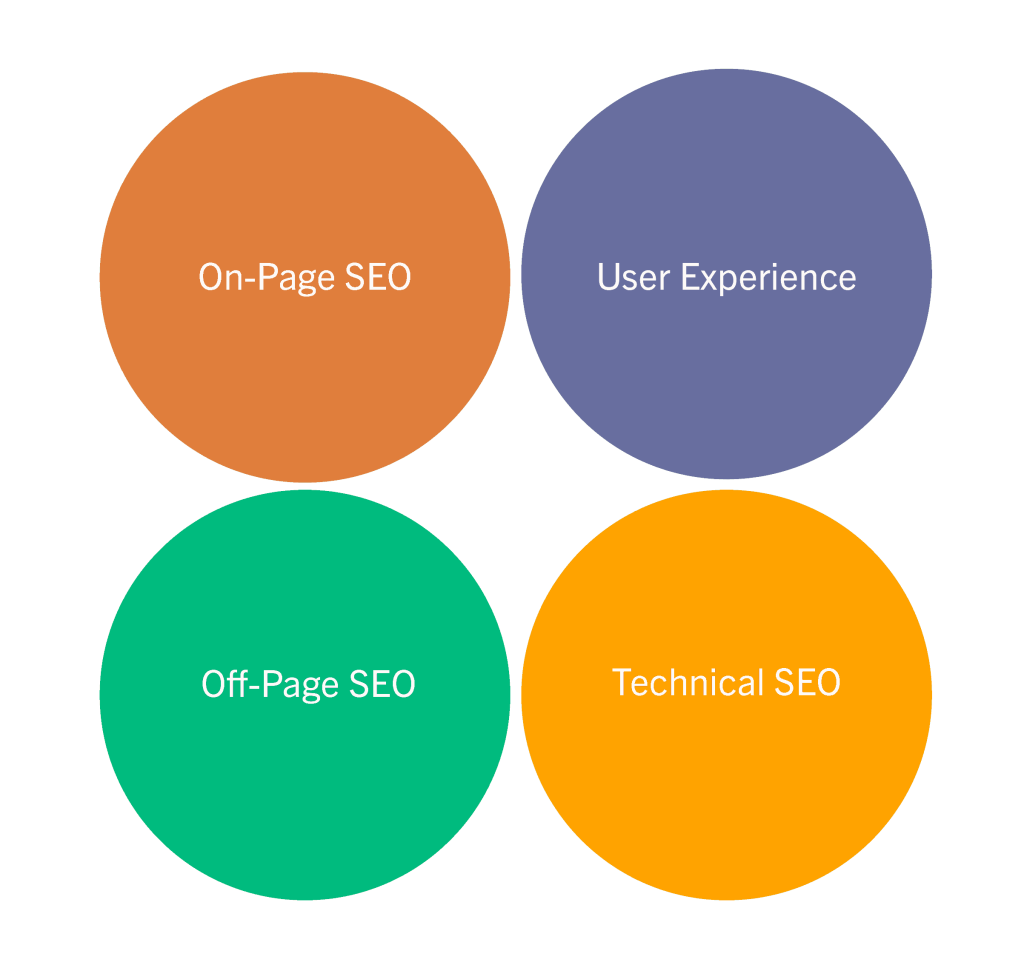
Image: Four Critical Components of SEO Strategy
These four components reflect the key areas of SEO that we know are crucial for determining how your website ranks in organic search. While you may not apply tactics across all strategic areas in every campaign, any comprehensive review of your website SEO strategy should include a look at all four elements and how their execution could be impacting your ROI and other measures of success.
With that said, let’s take a look at our four critical components of SEO strategy.
Technical SEO
Overview: Technical SEO is all about optimizing the technical implementation of your website to make it as functional as possible for both human users and web crawlers.
Why It’s Important: Search engines use web crawlers to discover and index new content on the Internet. However, there are numerous technical issues that can negatively impact this process and prevent crawlers from indexing your content. If this happens, your newly published blog post or thought leadership article will fail to appear in the organic search results.
Technical issues on your website can also impact users, especially things like broken links and images, a poorly implemented hierarchy of content, or page speed issues.
An effective SEO strategy must, therefore, address the technical implementation of your website to make sure it is optimized for both crawlers and human users.
Key Concept: Technical SEO Auditing is the process of reviewing your website implementation to ensure best practices have been followed. Most digital marketers perform SEO audits with the help of an SEO audit software tool.
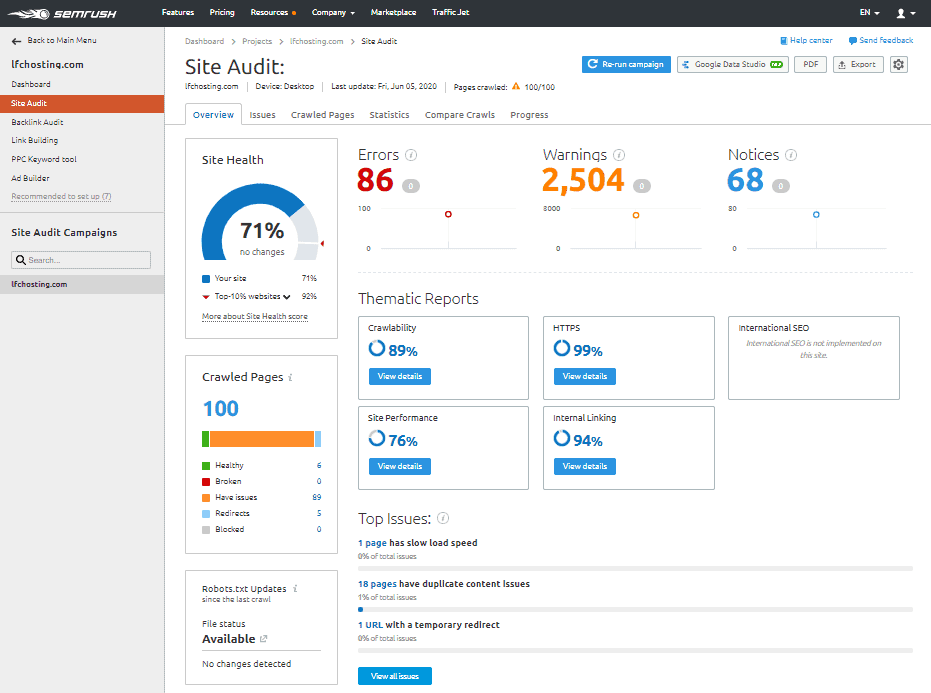
Image: A technical SEO audit tool like SEM rush Site Audit can help digital marketers locate and address technical website implementation issues.
User Experience Optimization
Overview: Google’s search algorithm has evolved in recent years to focus less on keywords and more on the user. User experience optimization is all about ensuring that users have the best possible experience when they land on your website, especially when visitors arrive from organic search results pages.
Why It’s Important: Google uses the Chrome browser to capture data from user sessions on your website, including session duration, pages per session, and bounce rate.
When visitors from search engines spend more time on your website and visit more pages, Google sees this as a positive indication of the usefulness and relevance of your website with respect to that search query, and you’re more likely to rank well in the future.
Effective SEO strategies need to focus on delivering the best possible user experience to maximize organic search performance.
Key Concept: Page Speed is a measurement of how long it takes for a web page to display its content and become responsible for the user. Slow loading pages are associated with high bounce rates and poor user experience.
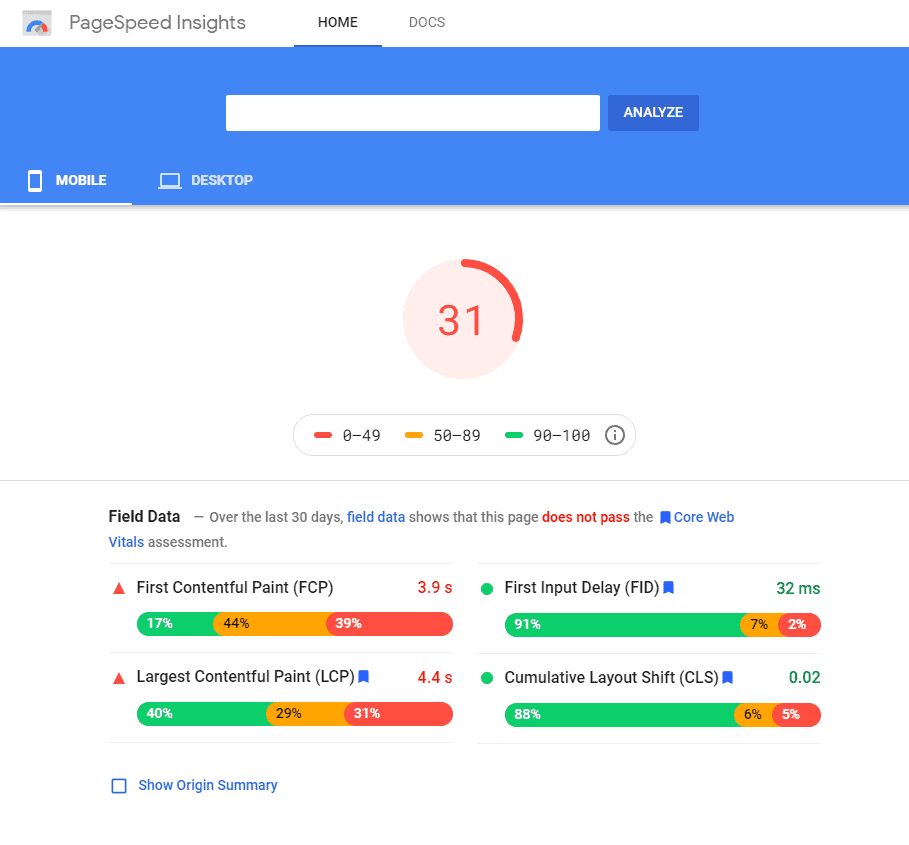
Image: Digital marketers can use Google PageSpeed Insights to evaluate their site speed, discover the root causes behind slow page loading times, and get recommendations for improving website performance.
On-Page Optimization
Overview: On-page SEO optimization deals with organic search ranking factors that are measured on individual pages of your website.
Why It’s Important: When search engine crawlers land on a page of content, they use on-page ranking factors to evaluate that content along several dimensions:
- What is the subject or theme of the page?
- Is this quality content?
- How trustworthy is this content?
- How authoritative is this content?
Websites with poor on-page SEO optimization have difficulty ranking in organic search. Crawlers may have difficulty finding pages on the site, or they may have difficulty understanding the subject matter and content of individual pages.
Key Concept: Keyword Optimization is a key tactic when it comes to effective on-page SEO. Each page of your website that you wish to rank in the SERPs should be optimized around a single focus keyword. No two pages should be optimized for the same keyword. Digital marketers use keyword research to discover new keywords to target with their content creation efforts.
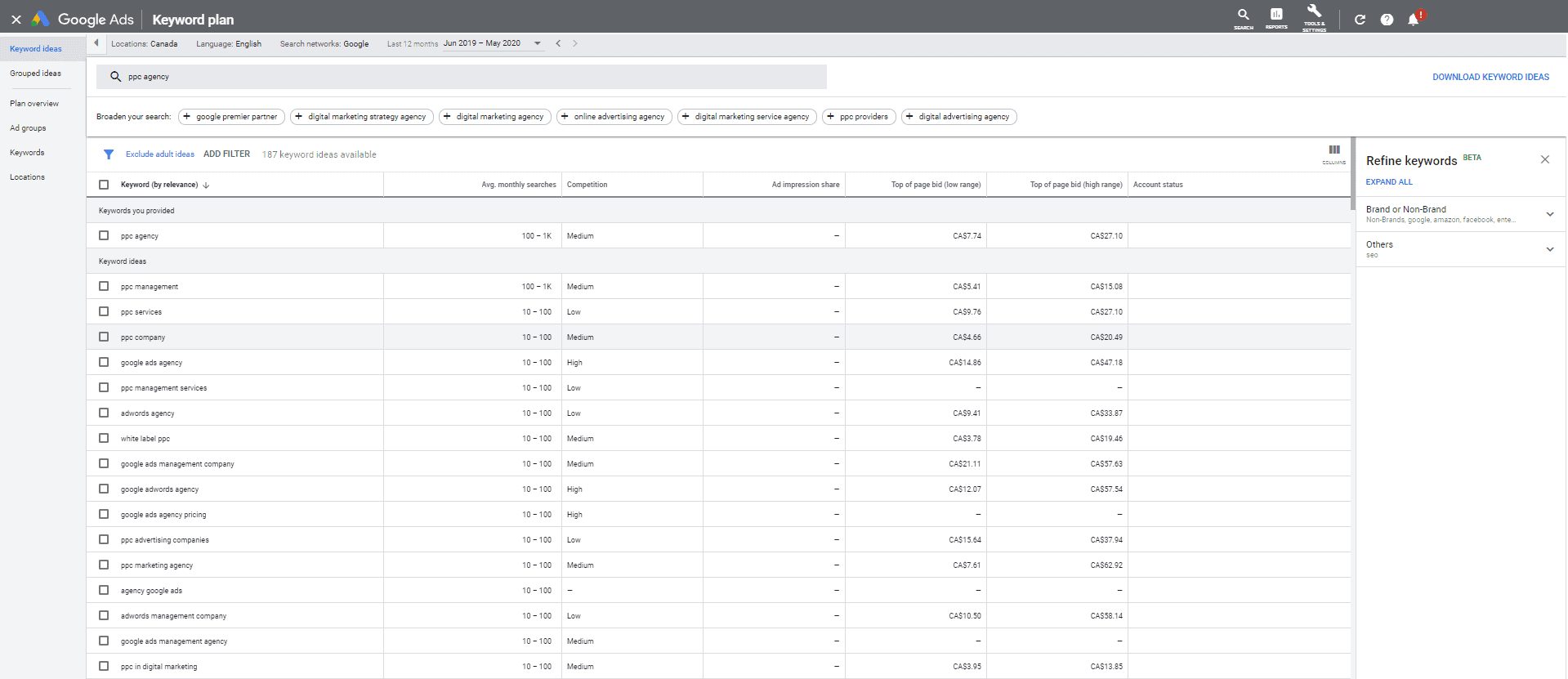
Image: The Google Ads Keyword Planner is a keyword tool that marketers can use to perform keyword research, access metrics like search volume and competition, and choose keywords to target with SEO-optimized content.
Off-Page Optimization & Link Building
Overview: Off-page SEO optimization is an element of SEO strategy that focuses on ranking signals measured away from your website, including backlinks and social media mentions.
Why It’s Important: When it comes to improving your organic search performance, one of the best things you can do is get other trustworthy, high-authority websites in your niche to link to your site.
While high-authority links will positively impact your organic search performance, low-quality links can actually result in ranking penalties from Google and Bing. Building quality links and disavowing toxic or spam links is, therefore, a critical aspect of SEO strategy
Key Concept: Negative SEO Attacks are not very common, but they do happen. This is when one of your competitors publishes a large quantity of low-quality links to your website from a low-trust domain. A negative SEO attack can result in ranking penalties from Google that negatively impact your organic search traffic.
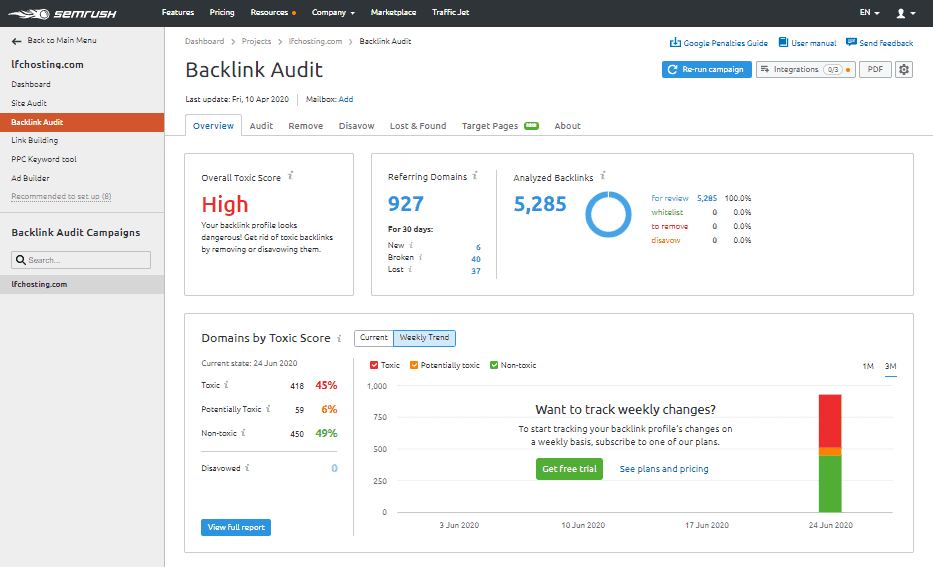
Image: Regular backlink audits should be performed by digital marketers to detect and disavow toxic or spam links that can result in SEO penalties.
Negative SEO attacks are fairly easy to detect and address as long as you’re paying attention – that’s why your SEO strategy should include regular reviews of your backlink profile.
How to Create an SEO Strategy for Your Website
To finish off our guide, here’s a quick step-by-step guide to creating an SEO strategy for your website.
Goal Setting
Every successful SEO campaign begins with goal setting. Goal setting creates a definition of success for your campaign and determines how success will be measured so you can focus on successfully executing your SEO strategy.
A great way to set goals is by choosing metrics that will act as key performance indicators (KPI) for your SEO campaign.
Some of the most common SEO campaign goals are:
- Increase organic web traffic
- Increase total page views
- Increase the total number of ranking search terms
- Increase website trust and authority
Defining Your SEO Strategy
Your SEO strategy is the plan that you will use to achieve your SEO campaign goals. Your SEO strategy should form a clear connection between your campaign goals and the specific tactics or methods that you will use to move toward success.
When creating your strategy, you want to look at SEO tactics across the four critical components SEO strategy and determine which ones will best help you maximize your results in the shortest time.
To do this effectively, marketers need to understand which SEO ranking signals have the biggest impact on organic search performance – a good starting point for that is the Ranking Factors 2.0 Study by SEM rush.
Organizing and Prioritizing SEO Tactics
You may have already recognized that different goals require different SEO strategies and tactics. A campaign to increase authority might focus more on off-page factors and backlinks, while one to increase page views might focus on user experience optimizations to reduce bounce rate and increase pages per session.
The best SEO strategy for you also depends on your starting point. A website with a lot of technical implementation issues and no SSL certificate should probably have those issues addressed before marketers turn their attention to keyword optimization or link building.
The best way to get organized is to rank your preferred SEO tactics based on their impact on your goals, how quickly they can be implemented, and your level of certainty that the tactic will prove effective in the way you expect. The best digital marketers go for the low-hanging fruit, seizing on the best opportunities to improve organic search performance in the shortest time – you should too!
Executing on Your SEO Strategy
Once you have identified the SEO tactics that can move you towards campaign objectives in the shortest time, your SEO strategy is basically complete. All that’s left is to execute on your chosen tactics!
Remember to prioritize the easiest fixes with the best results before taking on more complex SEO tactics.
Monitoring Results
Monitor the results of your SEO campaign, referring back to your goal setting and KPIs on a regular basis to make sure your efforts are aligned with campaign objectives. Remember, executing a great SEO plan takes time, and it can take even more time to see results. Patience and diligence are your best friends when it comes to effectively implementing your SEO strategy.
Summary
An SEO strategy that addresses all five critical components will have the best chance of catapulting your website to the top of the SERPs. We hope this guide helps you implement winning SEO strategies in your upcoming digital marketing campaigns.
For more details and a comprehensive look at how to build SEO strategy, check out our in-depth course on Directive Institute. In need of additional SEO help? Get in touch with the leading SaaS SEO firm by booking an intro call today!
-
 CEO
Garrett Mehrguth
CEO
Garrett Mehrguth
Did you enjoy this article?
Share it with someone!
